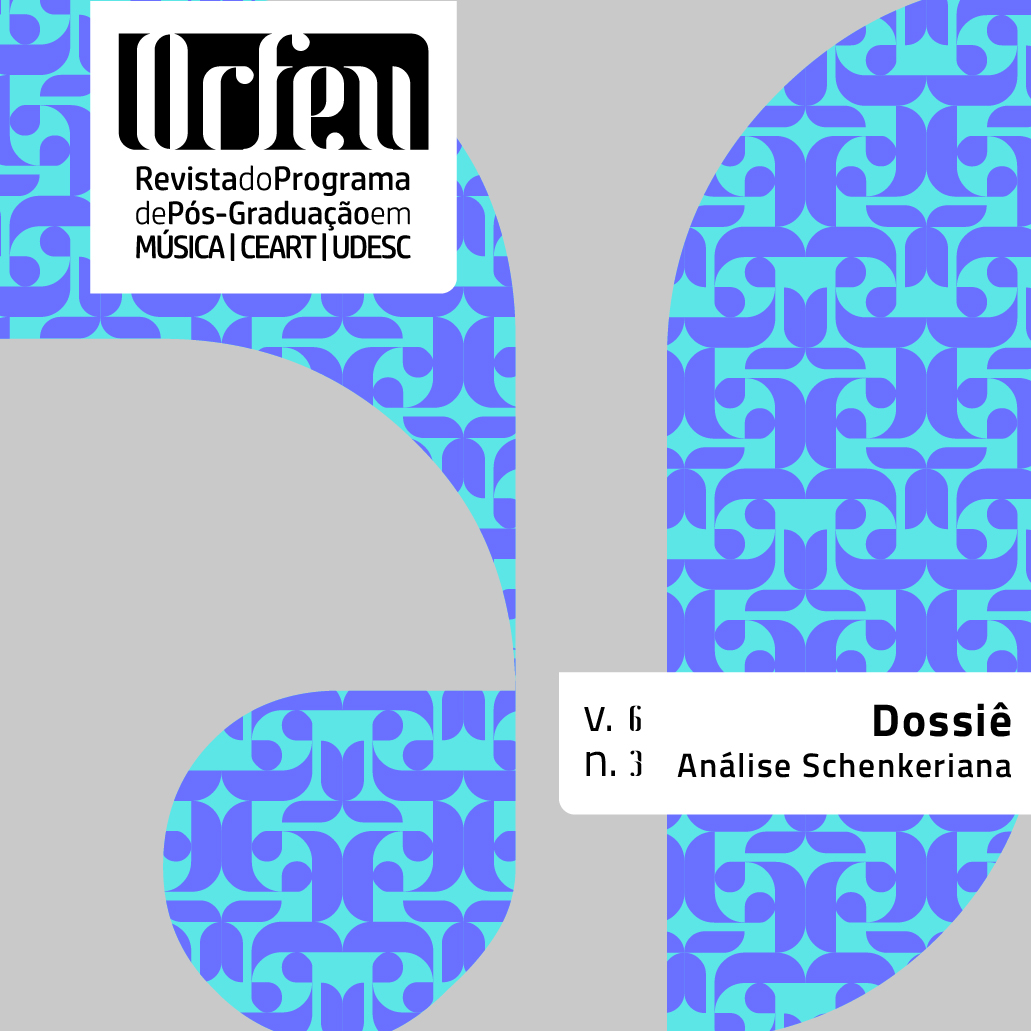Schoenberg contra Schenker contra Schoenberg: polêmicas sobre dissonância, motivo e forma e as reconciliações possíveis
DOI:
https://doi.org/10.5965/2525530406032021178Palabras clave:
Schoenberg, Schenker, análise musical, teoria musicalResumen
Este texto aborda uma das polêmicas mais importantes da teoria e análise musical do século XX. O embate entre Schoenberg e Schenker sobre a legitimidade das notas não harmônicas na música tonal, dissonâncias, a importância de motivo e forma. No texto busca-se discutir e esclarecer as concepções sobre estes assuntos e sua importância para as respectivas teorias analíticas de cada autor. Por fim, o texto apresenta as tentativas de reconciliação entre as duas tendências analíticas.
Descargas
Citas
ARNDT, Matthew. Schoenberg – Schenker – Bach. Zeitschrift Der Gesellschaft Für Musiktheorie 16, no. 1 (2019), p. 67–97.
BLASIUS, Leslie David. Schenker’s Argument and the Claims of Music Theory. Cambridge: Cambridge University Press, 1996.
BORIO, Gianmario. Schenker versus Schoenberg versus Schenker: The Difficulties of a Reconciliation. Journal of the Royal Music Association 126 (2001), p. 250–274.
BOSS, Jack. Schoenberg on Ornamentation and Structural Levels. Journal of Music Theory, 38 (1994), p. 187–216.
BOTSTEIN, Leon. Schenker the Regressive: Observations on the Historical Schenker. Musical Quarterly 86, no. 2 (2002), p. 239–247.
BOUCQUET, Kristof. Schenker and Schoenberg Revisited. Revue Belge de Musicologie 59, (2005), p. 193–203.
DAHLHAUS, Carl. Schoenberg and the New Music. Cambridge: Cambridge University Press, 1987.
DALE, Catherine. Tonality and Structure in Schoenberg’s Second String Quartet, Op. 10. London: Garland Publishing, Inc., 1993.
DUDEQUE, Norton. Music Theory and Analysis in the Writings of Arnold Schoenberg (1874-1951). Aldershot: Ashgate, 2005.
DUNSBY, Jonathan. Schoenberg and the Writings of Schenker. Journal of the Arnold Schoenberg Institute 2, no. 1 (1977), p. 26–33.
EPSTEIN, David. Beyond Orpheus, Studies in Musical Structure. Cambridge: MIT Press, 1979.
GERLING, Cristina Capparelli, e Sauerbronn de Barros, Guilherme. Glossário de Termos Schenkerianos. Salvador: TEMA, 2020.
KARNES, Kevin C. Music, Criticism, and the Challenge of History. Oxford: Oxford University Press, 2008.
KATZ, Adele. Challenge to Musical Tradition, A New Concept of Tonality. London: Putnam & CO., 1947.
LINKE, Karl, e Barbara Z. Schoenberg. The Teacher. In Schoenberg and His World. Ed. Walter Frisch. Princeton: Princeton University Press, 1999, p. 250–260.
PELES, Stephen. Was Gleichzeitig Klingt: The Schoenberg-Schenker Dispute and the Incompleteness of Music Theory. Music Theory Spectrum 32, no. 2 (2010), p. 165–171.
RATZ, Erwin. Einführung in Die Musikalische Formenlehre: Über Formprinzipien in Den Inventionen Und Fugen J. S. Bachs Und Ihre Bedeutung Für Die Kompositionstechnik Beethovens. 3rd. editi. Viena: Universal Edition, 1951.
ROSEN, Charles. Schoenberg. London: Marrion Boyars, 1975.
RUFER, Joseph. Composition with Twelve Notes Related Only One to Another. London: Barrie & Jenkins Limited, 1954.
RUFER, Joseph, e Newlin, Dika. The Works of Arnold Schoenberg: A Catalogue of His Compositions, Writings and Paintings. London: Faber & Faber, 1961.
SCHENKER, Heinrich. The Masterwork in Music v. II. New York: Dover Publications, 2014 [1926].
SCHENKER, Heinrich. Der Tonwille. Edited by William Drabkin. Vol. I. Oxford: Oxford University Press, 2004.
SCHMALFELDT, Janet. Towards a Reconciliation of Schenkerian Concepts with Traditional and Recent Theories of Form. Music Analysis 10, no. 3 (1991), p. 233–287.
SCHOENBERG, Arnold. Trad. Roy E Carter. Theory of Harmony. London: Faber & Faber, 1978.
SCHOENBERG, Arnold. Fundamentals of Musical Composition. Ed. Gerald Strang. London: Faber & Faber, 1967.
SCHOENBERG, Arnold. Style and Idea, Selected Writings of Arnold Schoenberg. Ed. Leonard Stein. London: Faber & Faber, 1975.
SIMMS, Bryan R. New Documents in the Schoenberg-Schenker Polemic. Perspectives of New Music 16, no. 1 (1977), p. 110–124.
SMITH, Charles J. Musical Form and Fundamental Structure: An Investigation of Schenker’s Formenlehre. Music Analysis 15, no. 2–3 (1996), 191–297.
STEPHAN, Rudolf. Schoenberg and Bach. In Schoenberg and His World. Ed. Walter Frisch. Princeton: Princeton University Press, 1999, p. 126–140.
TOORN, Pieter C. Van Den. What’s in a Motive? Schoenberg and Schenker Reconsidered. Journal of Musicology 14, no. 3 (1996), p. 370–399.
Descargas
Publicado
Cómo citar
Número
Sección
Licencia
Derechos de autor 2021 Norton Dudeque

Esta obra está bajo una licencia internacional Creative Commons Atribución 4.0.






